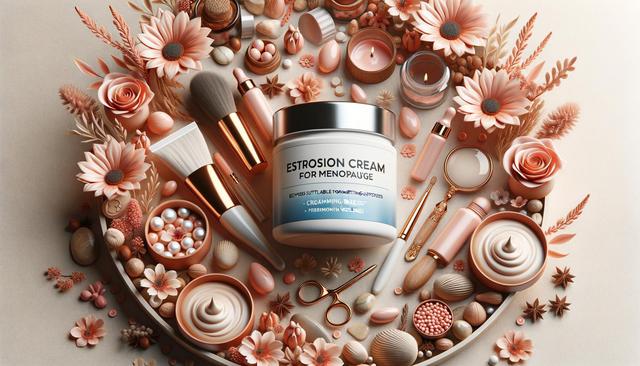
Understanding Estrogen Cream for Menopause Relief
What Happens During Menopause?
Menopause is a natural stage in a woman’s life, typically occurring between the ages of 45 and 55. It marks the end of menstrual cycles and is diagnosed after 12 consecutive months without a period. This process is accompanied by a sharp decline in estrogen levels, which can lead to a range of physical and emotional symptoms. Common changes include hot flashes, night sweats, mood swings, and vaginal dryness. These shifts are due to the body adjusting to hormonal changes, particularly the drop in estrogen that helps regulate many of the body’s systems. Understanding these changes is key to managing them effectively and seeking the right support.
Symptoms can vary in intensity and duration. For some, menopause passes with only mild discomfort. For others, it brings significant disruption to their daily life. Recognizing that these changes are biological and not a personal failure is essential. Seeking solutions such as estrogen cream is one approach to easing the transition.
How Estrogen Cream Works
Estrogen cream is a topical hormone therapy designed to deliver estrogen directly to the areas of the body that need it most. Unlike oral hormone treatments, which affect the whole body, estrogen cream is often applied locally—typically to the vaginal area or skin. This allows for targeted relief with potentially fewer systemic effects. The cream works by replenishing lost estrogen, helping to reduce dryness, improve skin elasticity, and support tissue health.
Some of the benefits of estrogen cream include:
- Reduction in vaginal dryness and discomfort
- Improved skin hydration and elasticity
- Decreased frequency of hot flashes (in some cases)
- Support for urinary tract health
It’s important to use estrogen cream under the guidance of a healthcare provider, who can help determine the appropriate dosage and monitor for side effects. The cream typically needs to be applied consistently to maintain its benefits.
Who Might Benefit from Estrogen Cream?
Estrogen cream may be particularly helpful for individuals experiencing localized symptoms of menopause, such as vaginal dryness or itching. Women who are not candidates for systemic hormone therapy due to health concerns might also find this option suitable. Additionally, those seeking a lower-dose alternative to oral hormone therapy may prefer a topical approach.
Those who might consider estrogen cream include:
- Women with mild to moderate vaginal symptoms
- Those experiencing skin changes due to low estrogen
- Individuals preferring non-oral hormone therapy
- Women who have undergone surgical menopause
However, like all treatments, estrogen cream isn’t for everyone. A thorough discussion with a healthcare provider is necessary to weigh the risks and benefits, particularly for those with a history of hormone-sensitive conditions.
Using Estrogen Cream Safely
Safety is a critical factor when using any hormone-based product. Estrogen cream should be applied as directed, usually a small amount once daily or a few times a week, depending on the prescribed regimen. Overuse can lead to unwanted side effects, and long-term use should be monitored by a healthcare professional. It’s also essential to follow the instructions provided with the product and report any unusual symptoms immediately.
Key safety tips include:
- Applying only the prescribed amount
- Washing hands thoroughly after application
- Avoiding contact with others immediately after use to prevent transfer
- Regular check-ups to evaluate effectiveness and safety
While side effects are typically mild, they can include skin irritation, breast tenderness, or spotting. If these occur, it’s important to consult a provider to adjust usage or explore alternatives.
Combining Lifestyle Support with Estrogen Cream
Although estrogen cream can be effective in managing certain menopause symptoms, combining it with healthy lifestyle habits can enhance its benefits. A balanced diet, regular physical activity, and stress reduction practices all contribute to overall well-being and can help mitigate the effects of menopause.
Ways to support menopause health include:
- Eating a diet rich in calcium and vitamin D for bone health
- Engaging in weight-bearing exercises to maintain muscle and bone strength
- Practicing mindfulness or yoga to manage mood and stress
- Staying hydrated and using gentle skincare products
These habits, paired with appropriate treatment like estrogen cream, can create a more balanced and manageable menopause experience. Support from healthcare providers, family, and peer groups also plays a crucial role in navigating this life stage with confidence.
Conclusion: Finding Relief with the Right Approach
For many, menopause brings challenges that affect daily life, but options like estrogen cream can offer relief when used wisely. This topical treatment can address specific symptoms, such as dryness and discomfort, while allowing for a more targeted approach. It’s essential to work with a healthcare provider to decide if estrogen cream is a suitable choice and to ensure its safe and effective use. When combined with supportive habits and open communication, this period of transition can become more manageable and far less overwhelming. Every individual’s experience is unique, and with the right care, it’s possible to move through menopause with greater ease and comfort.


